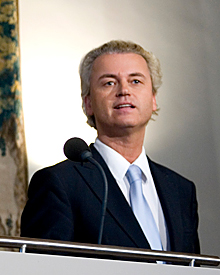Marked for Death: Islam’s War Against the West and Me
Dutch parliamentarian Geert Wilders has strong views on Islam and its growing influence in the West. In “Marked for Death,” he has penned a powerful book about his political odyssey in the Netherlands, where his Party for Freedom is the third-largest. His book places his personal saga in the context of broader events involving the political ideology of Islam.
In 2004, on a street in Amsterdam, Dutch filmmaker Theo van Gogh was brutally murdered by a Muslim of Moroccan descent. Van Gogh had collaborated with a Somali emigrant, Ayaan Hirsi Ali, to produce the film “Submission,” about the “abuse of women in Islam.”
Incredibly, Dutch political leaders reacted to the murder by suggesting that Islam’s critics should be penalized for “insults and blasphemy.” Meanwhile, van Gogh’s killer had impaled on his victim’s chest an “open letter” threatening death to Mr. Wilders and Ms. Ali, whose politics had put them on extremists’ “kill” lists. Two days after the murder, both were whisked into hiding by police because of “imminent threats” of assassination.
Ever since, Mr. Wilders and his wife have been living in “safe houses,” under guard around the clock. Mr. Wilders never goes anywhere without his government-assigned security contingent. While he was in Rome to receive the Oriana Fallaci Free Speech Award in 2009, a colleague counted 35 policemen guarding the door when Mr. Wilders went to the restroom. He jokes that it was “the best-protected pee” of his life, but the routine he endures because so many Islamists want to kill him is hardly a laughing matter.
Mr. Wilders is a student of Islam. His overview of its origins and doctrine will be familiar in part to readers of such books as Bernard Lewis’ “The Crisis of Islam,” Lawrence Wright’s “The Looming Tower” and George Weigel’s “Faith, Reason, and the War Against Jihadism.” He also offers carefully supported discussions of assorted Islamic practices, such as slavery, that are not as well-documented in these other works. Slavery continues today; having been approved by Muhammad, it cannot be repudiated.
Mr. Wilders draws effectively on the history of Islam to illuminate current events. Thus, he recounts the hijra,or migration, of Muhammad and his followers to Yathrib in the year 622. Taking advantage of its welcome and tolerance, Muhammad proceeded to overthrow the city from within. What was Yathribbecame Medina, and there Islam’s first mosque was Muhammad’s “propaganda center, the headquarters of his state … and the barracks of his jihad.”
For Mr. Wilders, Yathrib is the model for the offensive via immigration, or “migration,” that Islam has undertaken against the West almost 1,400 years later. Mr. Wilders also points to Medina’s first mosque as the “prototype” for mosques throughout the West, “primarily a political institution, not a place of worship.”
Mr. Wilders recounts the reaction that greeted his short film “Fitna,”produced to illustrate that “the Koran advocates violence.” He was prosecuted under Dutch hate-speech laws for “group insult” and “incitement” of “hatred” and “discrimination.” Although he was acquitted ultimately, Mr. Wilders’ tale on this topic is sobering, for it shows how “lawfare” can be used to chill unwelcome speech.
More recently, there are indications the Dutch government has moved in a better direction. After his acquittal in the trial over “Fitna,” the Organization of Islamic Cooperation issued a condemnation of Mr. Wilders clearly aimed at intimidating Western governments and politicians. In July 2011, the Dutch government denounced the OIC, refusing “to silence a politician” and reaffirming its “very high regard of freedom of speech.”
Despite difficulties, Mr. Wilders and his Party for Freedom have gained in power and influence. Through a coalition agreement with the two larger parties, proposals have emerged: to crack down on crime (many Muslim immigrants view criminal activity as fulfilling their religious duty of jihad); reduce welfare dependency (non-Western immigrants make up 11 percent of the Dutch population but 44 percent of welfare recipients; many Muslims think they should receive welfare payments as tribute, or jizya, from infidels); abolish affirmative-action programs that discriminate in favor of immigrants; strengthen naturalization requirements regarding language, good conduct and financial resources; and expel illegal immigrants.
In large part because of the courage of Geert Wilders and a handful of others, the Netherlands has begun to confront the damage wrought by Muslim migration and the politics of appeasement that for so long have characterized the West’s reaction to the claims of alleged victims of all stripes. As Mr. Wilders puts it, “The Islamic tide is strong, but the West has repulsed it before, and we can do it again.”
For the millions of tolerant citizens of the West, Mr. Wilders’ message can be captured by paraphrasing what Pericles said to the Athenians about politics: You may not be interested in Islam, but Islam is interested in you. So pay attention. And read this book.
Book Review from The Washington Times, by Ray Hartwell
Tags: Geert Wilders, Marked for Death: Islam's War Against the West and Me
- The Author

Geert Wilders
A member of the Dutch Parliament since 1998, Geert Wilders is the author of Marked for Death. He is the founder […] More about Geert Wilders.














